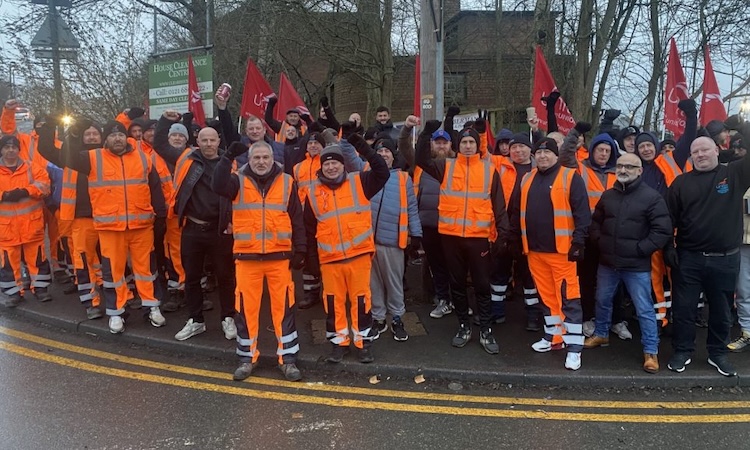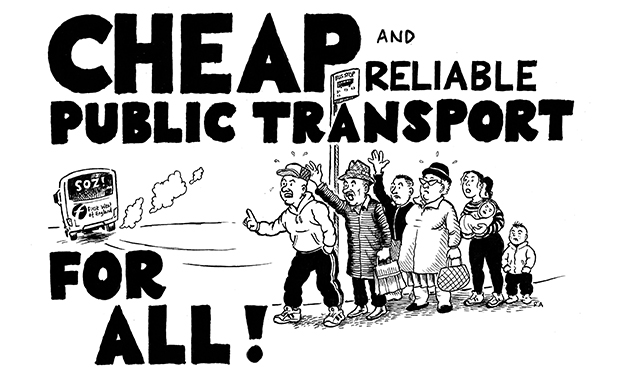The following article was written by Reddit user greaterlondoncouncil, and is reproduced with thanks. The order of some paragraphs has been changed.
*****
On Wednesday 25 May, the RMT union voted 89 percent in favour of a nationwide rail strike.
Forty thousand rail workers are going on strike, and, unlike previous industrial action, it will not only be train drivers and guards. For the first time ever, this is a coordinated strike across 13 different train operating companies in a system fragmented in a way that’s previously preventing this from happening.
Most importantly, Network Rail workers are also going on strike for the first time ever, meaning that signalling, track engineering, emergency maintenance and network coordination will also go down.
The latter point means that not only will passenger rail services be hit, but the freight network, which is a primary supplier of goods to the largest supermarkets in the country, may very well grind to a halt amidst a cost of living crisis.
Roots of the strike
There are two main issues motivating this action: pay cuts and redundancies.
During the pandemic, workers were subjected to a two-year pay freeze to make up for lost revenue in the rail industry. In light of the 9 percent [minimum!] inflation we are hitting right now, this effectively means that workers are being paid 10 percent less than they were three years ago. When the union asks for a ‘pay rise’, what it is really asking for is that its members should be paid at the same rate they were pre-Covid and not have to take a pay cut.
It is important to stress that this strike is mainly not about train drivers. Currently, the relatively high salary of some train drivers, at £61,000, is being circulated in the media to present the strikers as ‘greedy’. But the majority of strikers are chefs, signallers, cleaners, etc, who are getting a lot less. The average salary of an RMT member is about £25,000-£30,000, with some being paid barely minimum wage.
On top of this, Network Rail is currently looking to cut 2,500 jobs from its books, at a time when the industry is already understaffed. Anecdotal testimony from many workers describes departments that are already overstretched, so that they simply will not be able to continue the work they are doing if they lose any more staff.
To combat this across the industry, some firms are trying to get workers to give up their right to a Sunday rest day, which is another point of contention.
The RMT states that, amidst all this, Network Rail provided £235m in profits to private engineering firms, to do work that the company is mostly capable of doing in-house.
When the unions noted that the management demanding effective pay cuts from workers were being paid figures in the ballpark of £300,000 a year, Network Rail’s communications director stated that it was a lesson to people who “should’ve probably worked harder in school”.
A genius thing to say when your workers are balloting for a strike.
Navigating anti-union laws
The RMT, which had its leadership consolidated by allies of the Communist Party of Britain last year, has achieved an incredible victory in winning this ballot.
British trade union law, the most restrictive in western Europe, requires that any legal strike action can only occur if a majority of workers ballot to strike in an election that has a turnout of at least 50 percent. Regulations on these ballots are extremely tight, with prohibitions on in-person voting meaning that every member has to individually send their vote by mail for it to count.
This makes it extremely difficult to organise an election, as up-to-date address records have to be maintained on every single member, each one of whom has to send in a mail ballot. This law exists to prevent large-scale strikes, and my own union struggles to manage ballots on workplaces with over 100 people let alone 1,000.
Not only has the RMT union achieved to get a 71 percent turnout on an election of 40,000 people under such conditions, but it has managed to achieve a 89 percent majority in favour of striking, meaning that the media cannot claim that this strike does not represent the wishes of most railworkers.
Prepare for a vilification campaign
Speaking of the media, they are going to go into overdrive to bring the strike down. The RMT has been the victim of endless slander virtually since its inception, with attacks on its members and leaders from right-wing media based around their radical left-wing links and from liberal media based around their support for Brexit and implied ‘support’ for Russian president Vladimir Putin (which is a total lie).
Union organisers have been stalked by journalists, criticised for their choice to live in modest housing, their choice not to live in modest housing, their choice to travel by car, their choice to travel by train, for being too posh, for being from underprivileged backgrounds and numerous other ridiculous charges over the years that I do not have time to go through.
Public opinion on this strike is going to be heavily influenced by straight-up misinformation on the part of the media, and British leftists must fight this at every turn.
Suddenly caught on the back foot since the laws they’ve passed to prevent a strike on this scale have failed, the Tory government is going to try to rush through legislation that will render the strike as currently planned illegal. However, the RMT’s leaders have pledged to fight tooth and nail if any such law is passed.
If this strike becomes illegal, it will be an uphill battle for the government to rein in control. Unlike with the miners’ strike of the 1980s, our rulers cannot simply close down the network permanently as a long-term response. The sheer diversification of the skills involved in the strike and the time taken to train rail workers and engineers also makes it difficult to diffuse the strike with scabs, agency workers or the military.
Even more damning for any government attempt to suppress the right to strike is the response from the one million strong Unite union, whose recently-elected leader Sharon Graham has pledged industrial action of their own in case of such an event, with an even more radical response than the RMT, stating: “If you force our legitimate activities outside of the law, then don’t expect us to play by the rules,” and condemning the Labour party for its lack of involvement in the issue.
This has been followed up by statements of solidarity from two other significant unions.
Simply put, this nationwide strike may end up becoming a pivotal moment for the British labour movement, and is another sign that trade union radicalism is the highest it’s been for decades amidst economic dissatisfaction across the country.
The government could concede and pay the workers what they deserve, but the British left must prepare for what could be a long-drawn-out and determining fight for the future of labour power and the right to strike.
Solidarity with the RMT; workers of the world, unite; rest in peace Bob Crow!
______________________________
“At the start of your interview, you said that a two-day tube strike would cost the economy £100 million. What you are saying, then, is that when our members go to work for two days they are really worth 100 million quid.” (Bob Crow talking to Andrew Neil, Sunday Politics, BBC, 16 February 2014)











